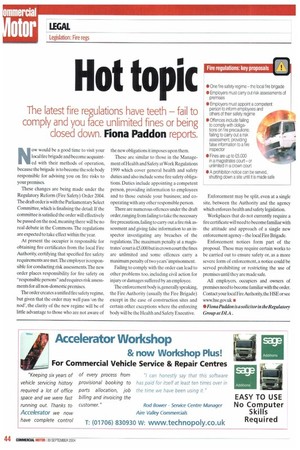Hot topic
Page 46

If you've noticed an error in this article please click here to report it so we can fix it.
The latest fire regulations have teeth — fail to comply and you face unlimited fines or being
closed down. Fiona Paddon reports.
Now would be a good time to visit your local fire brigade and become acquainted with their methods of operation, because the brigade is to become the sole body responsible for advising you on fire risks to your premises.
These changes are being made under the Regulatory Reform (Fire Safety) Order 2004. The draft order is with the Parliamentary Select Committee, which is finalising the detail. lithe committee is satisfied the order will effectively be passed on the nod, meaning there will be no real debate in the Commons. The regulations are expected to take effect within the year.
At present the occupier is responsible for obtaining fire certificates from the local Fire Authority, certifying that specified fire safety requirements are met. The employer is responsible for conducting risk assessments. The new order places responsibility for fire safety on "responsible persons" and requires risk assessments for all non-domestic premises.
The order creates a unified fire safety regime, but given that the order may well pass 'on the nod', the clarity of the new regime will be of little advantage to those who are not aware of the new obligations it imposes upon them.
These are similar to those in the Management of Health and Safety at Work Regulations 1999 which cover general health and safety duties and also include some fire safety obligations. Duties include appointing a competent person, providing information to employees and to those outside your business; and cooperating with any other responsible person.
There are numerous offences under the draft order, ranging from failing to take the necessary fire precautions, failing to carry out a fire risk assessment and giving false information to an inspector investigating any breaches of the regulations. The maximum penalty at a magistrates' court is £5,000 but in crown court the fines are unlimited and some offences carry a maximum penalty of two years' imprisonment.
Failing to comply with the order can lead to other problems too, including civil action for injury or damages suffered by an employee.
The enforcement body is,generallyspealdng, the Fire Authority (usually the Fire Brigade) except in the case of construction sites and certain other exceptions where the enforcing body will be the Health and Safety Executive. Enforcement may be split, even at a single site, between the Authority and the agency which enforces health and safety legislation.
Workplaces that do not currently require a fire certificate will need to become familiar with the attitude and approach of a single new enforcement agency -the local Fire Brigade.
Enforcement notices form part of the proposal. These may require certain works to be carried out to ensure safety or, as a more severe form of enforcement, a notice could be served prohibiting or restricting the use of premises until they are made safe.
All employers, occupiers and owners of premises need to become familiar with the order. Contact your local Hre Authority, the HSE or see www.hse.gov.ulc •
• Fiona Paddon isasolicitorin theRegulatory Group at DIA .


































































































































































































